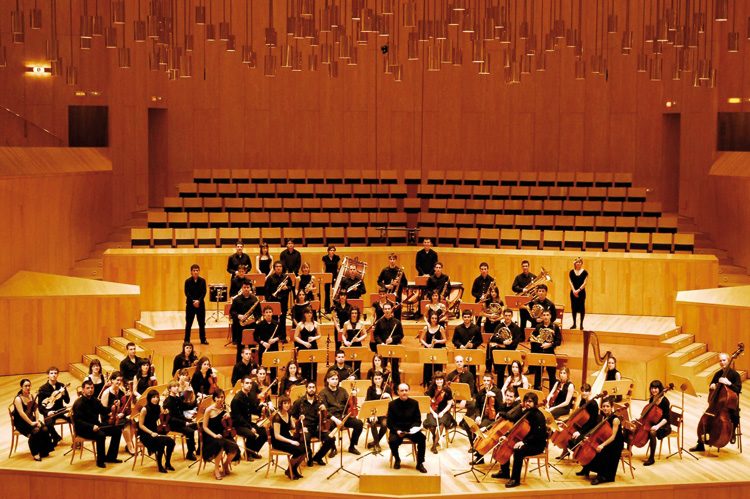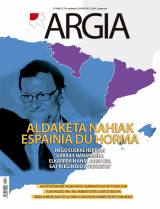Cultivated wind bohemians

It is usual that at the end of the course, within the program of the Symphony Orchestra of Navarra, a concert is held with orchestras of the conservatory. This year the challenge was not easy: J. Variations on a theme by Haydn de Brahms, Carmen de Bizet, the first suite, and Dvorak Symphony No. 8.
The Orchestra, made up of conservatory students and with many reinforcements of the Orchestra of Navarra (mainly in strings, only tumpas to the wind). The director is Valencian Vicent Egea, a band and orchestra professor at the conservatory and director of the municipal music band La Pamplona.
Variations on a Haydn theme in Brahms started the performance. Despite the risks of lack of coordination that were detected at some points in time, the orchestra maintained the work in the eight variations. A lack of strength was often observed, especially in violoncellars, as the strings remained below the others of the family. Thin wind wood. The German composer showed with pieces like this that dominated the language and style of the classics, and we were able to see that. Nice gesture, imitating the Austrian on many occasions (more than usual) the final chord.
Carmen de Georges Bizet is the most important opera of the French opera and one of the most famous operas in history. With the major instrumental parts of the opera, Ernest Guiraud made two suites for the orchestras to act as recitals. The Conservatory was the first one he gave in Baluarte. Touches of fresh orchestration and folklore were joined by an essential factor: many topics were well known to the general public. The metal wind had remained above in some pieces (perhaps due to the lack of strength of the rest of the orchestra), but, moreover, it was noted that it had been prepared for a long time. The sweetest moment of the performance was the intermezzo, with a preludio-Toreador who put a golden brooch on the first part.
After the break, the most important part of the cake. Symphony number 8 in Antonin Dvorak's Major Sun. I will confess that I have a special sensitivity to Dvorak. I usually love the work based on the folklore and traditional music of many composers of the second half of the 19th century in Europe and Russia (with Bela Bartok I would reach the end), and the results obtained by Dvorak in Slavic symphonies and dances always amaze me. The traditional music of his land (Bohemia, the current Czech Republic) was perfectly combined with the romantic style of the time, always accompanied by an extraordinary genius for the orchestration.
The Symphony No. 8 was composed three years before the famous No. 9 was released in the United States, still in Europe. Without being long (40 short minutes), in the four movements we receive energy, sensitivity, strength and amazing melodies (those we usually have in the head in hours), accompanied by a strong traditional wind. The orchestra, to the astonishment of many, very thin. On this occasion, the chelos with more strength (if there were any more, better), the violins with a lot of energy and the wood and metal sections of quality. The large traditional orchestras (especially the philharmonics of Berlin and Vienna) have always doubled their trumpets in works like this, greatly increasing their volume and strength. In this case it was not so (they were only two trumpets), but well decided, as the orchestra would not be kept at that volume level. The great work behind it was evident from the interpretation of that day. Simple, but dignified.
After a well-deserved applause, they repeated the prelude of the opera Carmen in the morning, ending the session.
We know where we are. We know that the Symphony Orchestra of Navarra is not from the Basque Country, and with the conservatories the same thing happens. However, it is a great joy to receive these kinds of surprises, to listen and enjoy a good program in this unimportant city of orchestral music. So be it from now on.
Emanaldia: Nafarroako Goi Mailako Musika Kontserbatorioko orkestra. Zuzendaria: Vicent Egea. Maiatzak 3, Baluarte auditorioa. Brahms, Bizet eta Dvoraken obrak.
Abuztuaren 31n Pablo Sarasate Fundazioa desegingo du Nafarroako Gobernuak. Kontuen Ganberak Orkestra Sinfonikoan izandako irregulartasunen ondorioz hartu dute erabakia.
Urtarrilean Nafarroako Kontuen Ganberak foru erkidegoko orkestra sinfonikoaren kudeaketari buruzko txostena argitaratu zuen, zenbait irregulartasun nabarmenduz. Asteartean azalduko ditu Gobernuak txostenaren ondorioz hartuko dituen neurriak.










